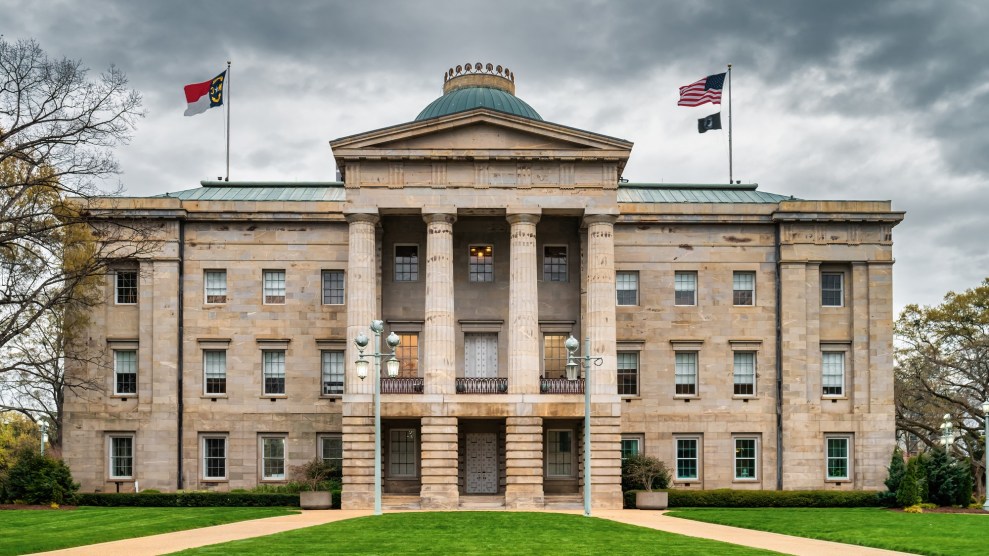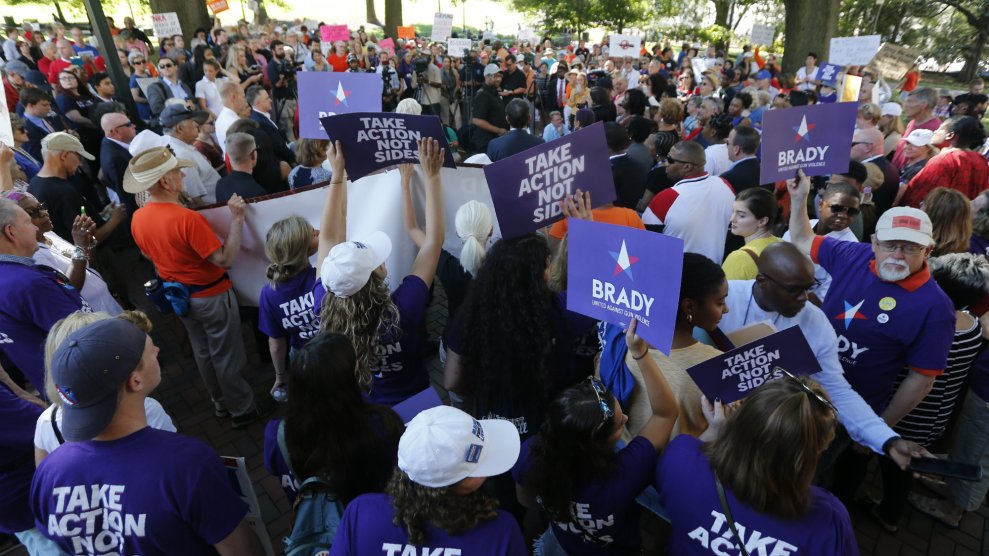
North Carolina's capitol building in Raleigh.Benedek—Getty Images
North Carolina’s state legislature has been controlled by Republicans for more than a decade, but when Tricia Cotham, a Democratic state representative, switched party allegiances to join the GOP last Spring, the Republican majority in the statehouse increased by one more seat to 72-48, an exact three-fifths majority.
While this addition may seem marginal, it gave state Republicans a tremendous new superpower: the ability to override a governor’s veto. It was a power they didn’t hesitate to use. Within weeks, Republican lawmakers put in place the 12-week abortion ban Democratic governor Roy Cooper had tried to veto, further curtailing abortion access from the previous limitation of 20 weeks.
The fact that a single state representative can upend policy for an entire state is not new, nor is it restricted to abortion or North Carolina. A GOP-led attempt in the New Hampshire legislature to amend a “parent rights” proposal to include a requirement that teachers ask parents permission before abiding by a student’s selection of pronouns was defeated by a slim 190-194 margin before the statehouse voted 193-192 in favor of tabling the whole bill, for now.
These outcomes are striking reminders of the stakes at play in upcoming state legislature elections in today’s hyper-polarized political climate.
When the US Supreme Court removed the constitutional protection of abortion rights in its 2022 Dobbs v. Jackson Women’s Health Organization decision, statehouses across the country held the power to either strengthen or constrain reproductive rights. With a near-deadlocked US Congress, state legislatures also enjoy regulatory power over several critical issues, from gun control to healthcare access, parental leave to affordable childcare, and the roles of schools in abiding by students’ gender identities.
Add to this the future power of political parties in both state and national elections. More than two-thirds of states entrust to their state legislatures the role of reworking state legislative and congressional voting maps, which then will determine the representation of voters. Sometimes, the maps are so one-sided in consolidating groups of voters that courts have to step in and make them more fair. In Georgia, for example, a federal court ruled in October that a gerrymandered map violated the Voting Rights Act by diluting Black majority districts.
Such prospects are why the Democratic Legislative Campaign Committee, the party’s primary organization dedicated to electing Democrats to state legislatures, is making early contributions to what the group sees as pivotal 2024 state legislative races. On Wednesday morning, they announced $271,000 worth of investments into six pivotal states. The cash will go towards state legislature candidate recruitment, staff hiring, digital investments, and field operations. Just under a year out from 2024 Election Day, the investment is a small chunk of the $60 million the DLCC hopes to invest this year, interim DLCC president Heather Williams told Mother Jones. That’s $10 million more than the group’s operating budget last cycle.
These states “are the ones where we think that the path to gaining power or holding it for Democrats is clearest,” says Williams.
Here’s how the early funding broke down:
-
$82,000 to Michigan’s statehouse, which is currently split 54-54 with two vacancies. Democratic wins there would help retain the trifecta the party won in 2022 for the first time since 1984; since gaining control, Democrats have voted to strengthen protections for gender identity and sexual orientation and increase the state’s Earned Income Tax Credit.
-
$70,000 to Arizona’s legislature, where Republicans enjoyed a partisan trifecta from 2009-2022; the GOP currently controls the state senate 16-14 and the statehouse 31-29.
-
$50,000 to the New Hampshire statehouse, whose slim Republican majority and strong Democratic vote attendance have enabled Democrats to block a bill encouraging teachers to out gender-nonconforming students to their parents based on pronoun use.
-
$30,000 to the Pennsylvania general assembly, where Democrats have just a one-seat majority; Republicans enjoy a six-seat lead in the state senate.
-
$24,000 to the Wisconsin state legislature, where Republicans have a supermajority in the state senate and are just a couple of seats away from a supermajority in the state assembly, which would allow the party to override vetoes from the Democratic governor.
-
$15,000 to the North Carolina statehouse, where the DLCC hopes to rescind Republicans’ ability to override gubernatorial vetoes.
The DLCC is counting on these early investments, plus spiking political engagement as a result of topics like abortion, to become pivotal factors in what used to be relatively sleepy races. “I think for a long time people felt like their state governments were about broad execution of funding measures and regulation—kind of meaty, wonky things,” says Williams. “I’ve been in legislative politics my whole career. Dobbs felt like a shift on that front where that tangible nature of the impact of your state legislature became just so crystal clear.”
















